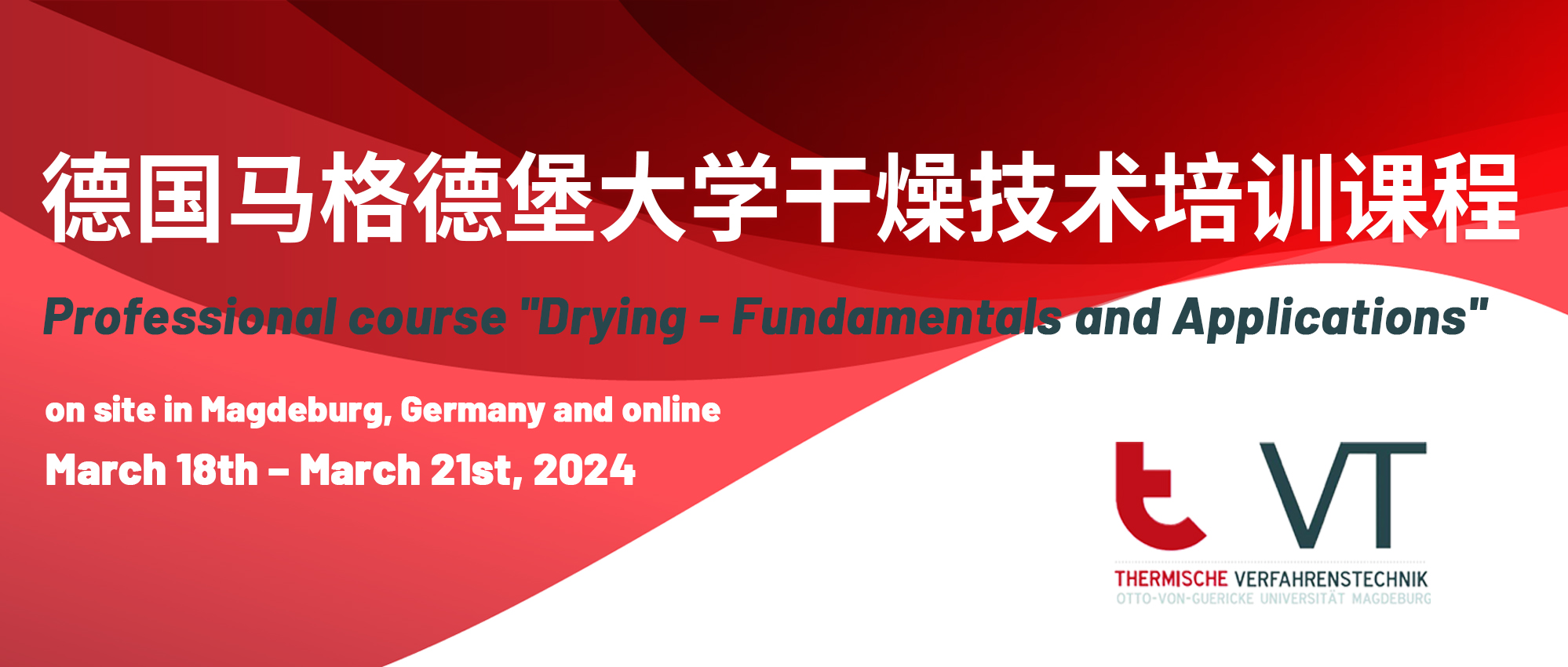
德国马格德堡大学干燥技术培训课程是一门涵盖现代干燥技术基础理论及工业应用的综合课程,自2014年成功举办以来,已吸引学术界和工业界的广泛关注。2024年,恰逢课程开办10周年,培训定于2024年3月18日至21日(德国时间)与大家见面。
本次课程以“线上+线下“形式授课,授课语言为英语,内容包括干燥基础理论、工艺、设备,以及多种常规及特殊干燥过程的设计、放大和应用等多个方面。此外,本课程还将安排实验室实践活动和模拟计算指导,欢迎相关领域学者和研发技术人员关注并报名参加~
课程概况
Target audience
The course is designed for people from various backgrounds (engineers, chemists, food and pharmaceutical technologists) and with different levels of experience, who need to understand the fundamentals of modern drying technology and apply them to produce better solid / particulate products with more efficient drying processes. The course language is English.
Topic
Almost every material used in solid form (from foods to pharmaceuticals, from minerals to detergents, from polymers to paper, from raw materials and commodities to highly formulated specialties) is dried during production. Drying technology is, therefore, a continuously developing field with various challenges referring to process design, development, operation and automation, to equipment selection, development and use, as well as to the preservation or even creation of desired product properties.
The purpose of the course is to provide the essentials of modern drying technology to the participants in a broad but compact way, at a high but understandable level close to practice. The course starts at the very beginning (why shall materials be dried and how can this be done?), and then discusses: elementary approaches and methods (how does the drying medium used relate to the capacity of the process and to the achievable product moisture?); drying kinetics (why are certain materials more difficult to dry than other ones?); dryer design and scale up methods (how long will drying of a specific product take, how big will the dryer need to be?); instrumentation (how can gas moisture or even product moisture be measured and monitored in my equipment?); options and alternatives (why shall I use a certain drying method and the respective equipment, instead of another one?); and opportunities (how can I use drying for particle formulation, how can I reduce the energy demand of my process?).
This is done in three complementary ways: Lectures, laboratory work (demonstration of experimental methods and equipment in one of the leading laboratories in drying technology), and tutorials (ranging from simple exercises to solidify the understanding of principles, and the guided evaluation of data measured in the lab, to the application of modern computational tools for dryer design). Beginners in drying will take with them from the course the broad overview and the sound basis of skills that they need for their every-day work; experienced people will refresh their knowledge and renew their point of view up to the cutting-edge of drying technology in experimentation and modeling.
授课专家
Otto von Guericke University Magdeburg
Prof. Evangelos Tsotsas
Priv.-Doz. Dr.-Ing. Abdolreza Kharaghani
Hamburg University of Technology
Prof. Stefan Heinrich
External speakers
Prof. Andreas Bück, University Erlangen
Dr.-Ing. Michael Jacob, Glatt Ingenieurtechnik GmbH, Weimar
M. Sc. Arne Teiwes, Glatt Ingenieurtechnik GmbH, Weimar
Prof. Mirko Peglow, IPT-Pergande GmbH, Weißandt-Gölzau
Dr. Roland Wernecke, Dr. Wernecke Feuchtemesstechnik GmbH, Potsdam
Prof. Maciej Jaskulski, University of Lodz
课程内容
Course program
Fundamentals of drying technology
• Goals of drying: product quality and process efficiency
• Relevant material properties (sorption, water activity, glass transition etc.)
• Particle/product formulation by drying
• Drying methods, types of dryers, dryer selection
Properties of wet air, capacity of convective dryers
• States and processes on psychrometric charts
• Adiabatic saturation temperature
• Air conditions in and capacity of convective dryers
Moisture measurement techniques
• Gas moisture, particle/solids moisture
Drying kinetics of single particles or droplets
• Wet bulb temperature, drying curve, drying periods
• Methods of measurement or of indirect determination
• Normalization, second drying period models
• Understanding drying with the help of pore networks
Major drying processes: Equipment, dryer design, scale up
• Generic examples of convective dryer design
• Fluidized bed drying
• Spray drying
• Vacuum contact drying, freeze drying
Special drying processes and applications, energy demand
• Atmospheric freeze drying, microwave and high-frequency drying, microwave vacuum / freeze drying, superheated steam drying, impingement drying, supercritical drying
• Energy use and savings
Laboratory work (guided exercises and demonstrations)
• Various equipment for moisture measurement, particle characterization, drying
• Drying kinetics of droplets in the acoustic levitator
• Drying kinetics of particles in the magnetic suspension balance
• Batch and continuous fluidized bed drying
Tutorials (guided practical computations and simulations)
• Exercises on material properties, wet air, dryer capacity
• Evaluation of drying kinetics for single droplets and particles
• Fluidized bed dryer design and scale-up (batch, continuous)
• CFD simulation of spray dryers
课程信息
线下地点:
Otto von Guericke University Magdeburg
Bld. 10-110 and various labs
Universitätsplatz 2
39106 Magdeburg, Germany
课程时间:
开始时间:Monday, 18th March, 2024, 1:00 p.m.
结束时间:Thursday, 21st March, 2024, 1:30 p.m.
(以上均为德国时间,请注意时差)
课程注册:
线上注册网址:www.tvt.ovgu.de/Drying
或发送邮件至:
Mr. Felix Dieckmann
Email: operations@ovgu.gmbh
Phone: +49 391 67 52 773
Mobile: +49 176 433 70 666
Subject: Professional Course Drying
Required: Name, contact address, employer, billing address, online or on site participation
课程费用:
1650欧元/人(plus VAT, if applicable)
课程费用包含课程资料、茶点、咖啡、第三晚的正餐。
请在收到参加确认书及发票后再汇款,2024年3月4日前可取消注册(扣除手续费50欧元);过时将无法退款,但可以指定其他参会者。
住宿:
Hotel Ratswaage Magdeburg (15 min. walking distance) offers singlerooms with breakfast and use of wellness facilities for a special rate upon availability.
Keyword: Professional Course Drying
Phone: +49 391 5926192
E-mail: reservierung@ratswaage.de
URL: www.ratswaage.de
联系人:
Prof. Dr.-Ing. Andreas Bück
Phone: +49 913185 29403
Email: andreas.bueck@fau.de
供稿:课程会务组
编辑:《颗粒学报》编辑部
